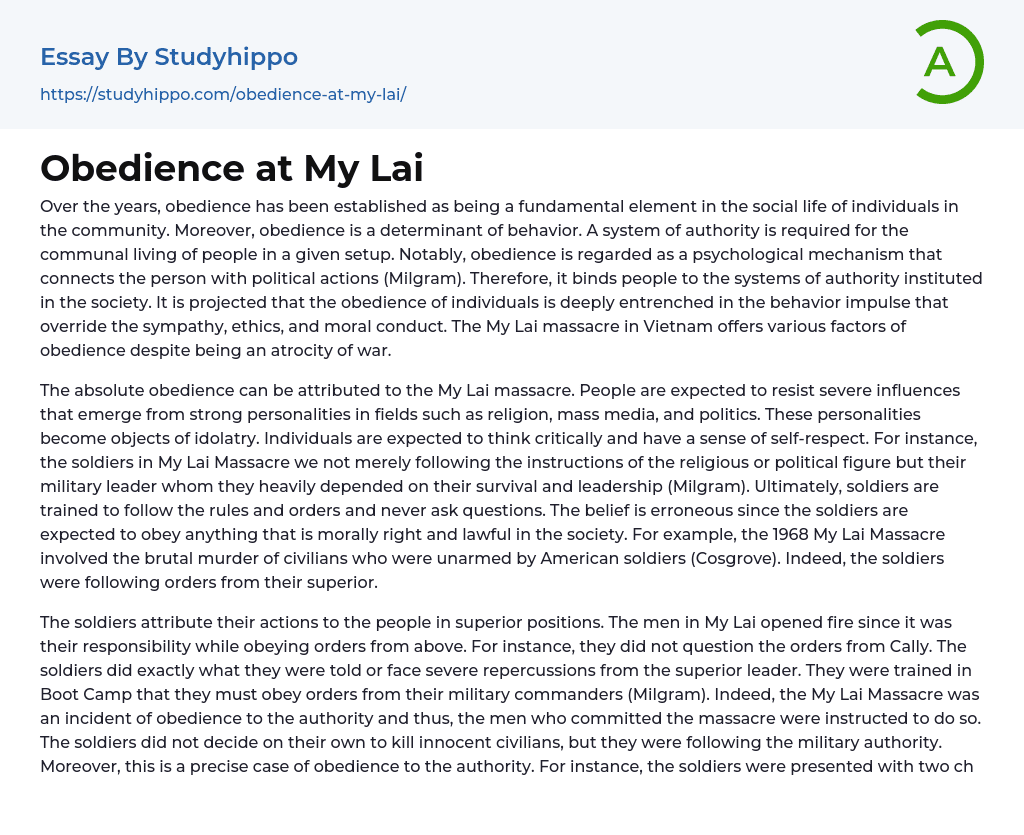Over the years, obedience has been established as being a fundamental element in the social life of individuals in the community. Moreover, obedience is a determinant of behavior. A system of authority is required for the communal living of people in a given setup. Notably, obedience is regarded as a psychological mechanism that connects the person with political actions (Milgram). Therefore, it binds people to the systems of authority instituted in the society. It is projected that the obedience of individuals is deeply entrenched in the behavior impulse that override the sympathy, ethics, and moral conduct. The My Lai massacre in Vietnam offers various factors of obedience despite being an atrocity of war.
The absolute obedience can be attributed to the My Lai massacre. People are expected to resist severe influences that emerge from strong personalities in fields suc
...h as religion, mass media, and politics. These personalities become objects of idolatry. Individuals are expected to think critically and have a sense of self-respect. For instance, the soldiers in My Lai Massacre we not merely following the instructions of the religious or political figure but their military leader whom they heavily depended on their survival and leadership (Milgram). Ultimately, soldiers are trained to follow the rules and orders and never ask questions. The belief is erroneous since the soldiers are expected to obey anything that is morally right and lawful in the society. For example, the 1968 My Lai Massacre involved the brutal murder of civilians who were unarmed by American soldiers (Cosgrove). Indeed, the soldiers were following orders from their superior.
The soldiers attribute their actions to the people in superior positions. The men in My La
opened fire since it was their responsibility while obeying orders from above. For instance, they did not question the orders from Cally. The soldiers did exactly what they were told or face severe repercussions from the superior leader. They were trained in Boot Camp that they must obey orders from their military commanders (Milgram). Indeed, the My Lai Massacre was an incident of obedience to the authority and thus, the men who committed the massacre were instructed to do so. The soldiers did not decide on their own to kill innocent civilians, but they were following the military authority. Moreover, this is a precise case of obedience to the authority. For instance, the soldiers were presented with two choices; to kill innocent people or face the law for disobeying orders (Cosgrove). In reality, they did not have a choice, but in the eyes of the government, they served to their best of knowledge.
Obedience demands that an individual has an obligation to follow orders from the leaders. Indeed, this is what ensures that military operations are successful. The soldiers have the only obligation of obeying orders without asking. For the case of My Lai Massacre, the rules went overboard. For instance, hundreds of people were killed and property destroyed in the name of following orders (Milgram). The men were not doing this for their individual gain but merely obeying orders. What the soldiers did in the face of people were morally evil but they were following orders which they had no option but to follow.
To a greater extent, obedience is a fundamental element of the society. Obedience ensures that the society has law and order. For
the case of My Lai, obedience disrupted law and order in Vietnam. For instance, the soldiers in My Lai had an obligation of obeying orders or face the full arm of the law. The obedience presented in the My Lai Massacre is morally wrong despite being an act of following orders from the superiors. The obedience in My Lai is characterized by uncertainty, time pressure, and conformity to the authority.
Works Cited
- Cosgrove, Ben. "American Atrocity: Remembering My Lai." Time (2013): Web.
- Milgram, Stanley. "Obedience to Authority." Panarchy (2011): Web.
- Adaptation essays
- Adventure essays
- Adversity essays
- Aging essays
- Alcohol essays
- Barbie Doll essays
- Beauty essays
- Care essays
- Carpe diem essays
- Change essays
- Chess essays
- Chicken essays
- Choices essays
- Contrast essays
- Crops essays
- Development essays
- Dream essays
- Evil essays
- Experience essays
- Family essays
- Farm essays
- Fire essays
- First Love essays
- Focus essays
- Greed essays
- Hero essays
- Holiday essays
- House essays
- Housing essays
- Humility essays
- Humor essays
- Hypocrisy essays
- Integrity essays
- Law of Life essays
- Life Changing Experience essays
- Life Experience essays
- Lifestyle essays
- Limitations essays
- Love Story essays
- Mother Tongue essays
- Motherhood essays
- My Neighborhood essays
- Myself essays
- Mystery essays
- Narcissism essays
- Never Give Up essays
- Nursing essays
- Object essays
- Opportunity essays
- Peel essays




